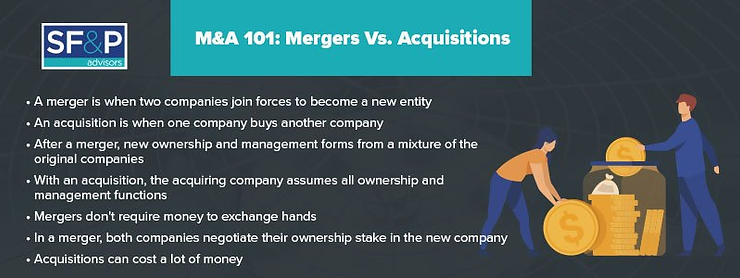Merger vs. acquisition: What’s right for your business?

Mergers and acquisitions — these words are often used together, and they are often conflated for each other, but they have important differences. Both mergers and acquisitions refer to the joining of two companies, but they use different processes.
A merger is when two separate entities join together to form a completely new entity. In contrast, an acquisition is when one entity takes over or purchases another entity. To help you understand which option may be right for your situation, this guide breaks down the nuances and differences between these two common types of transactions.
Examples of mergers and acquisitions
Again, a merger is when two companies join together to make a new entity. For example, if Brent’s Burgers and Toby’s Tacos combine forces to become B and T’s Burgers and Tacos, that is an example of a merger.
With an acquisition, a larger company usually buys or acquires a smaller company. To continue with the above example, imagine that Toby’s Tacos is struggling, and Brent’s Burgers is poised for growth. Brent’s Burgers acquires Toby’s Tacos and changes its name to Brent’s Burgers and Tacos.
Ownership and management after a merger
Typically, with mergers, the new entity has a new ownership and management structure, but the exact setup depends on the value of each company and the terms of the transaction. Brent and Toby, for example, may set up their company so that they each have a 50% ownership stake in the new company.
However, if Brent’s Burgers brings more value to the new entity, they may decide that Brent owns more than half of the B and T’s Burgers and Tacos, while Toby owns a smaller share. The process is similar when you’re dealing with companies owned by stockholders: All the stocks of the existing companies are surrendered, and the new company issues new stocks.
In that same vein, the new company may keep its existing management team or form a new team with members from each company. A similar process may apply to the administrative team.
Ownership and management after an acquisition
When Brent acquires Toby’s Tacos, he becomes the sole owner of the company, and he has all the power. If Toby’s Tacos were owned by shareholders, they would essentially sell their shares, and the shareholders of Brent’s Burgers would become the new owners of the company.
After the acquisition, Brent also takes over the operational and management decisions of the new company. He can decide if he wants to eliminate Toby’s entire management team or keep some of them on board. In either situation, he is the new employer of any of Toby’s employees who stay after the acquisition.
Reasons for mergers and acquisitions
Both mergers and acquisitions can help companies save money, expand into new markets, and offer new product lines. For example, whether the burger business merges with or acquires the taco business, it gets to expand into the market served by the taco company. It also gets to offer all of the items from the taco company’s menu.
To give you an example of operational savings, consider the fact that both burgers and tacos can be made with ground beef. Whether Brent merges with or acquires Toby’s business, the new entity requires more ground beef, and because it’s buying more, it is able to negotiate a lower price with its suppliers. In fact, some companies acquire their suppliers for this exact reason.
Here’s another example of operational savings. Say that both companies have their own marketing teams, but after the merger or acquisition, the new ownership pares down the marketing team. The new streamlined team can handle all the marketing, but it costs a lot less than paying for two distinct teams.
Business valuation and negotiation in mergers vs acquisitions
The valuation process varies between a merger and an acquisition. Mergers do not involve the transfer of money, but they do end up diluting the power of each company. In most cases, the valuation process for a merger focuses on negotiating how the relative value of each company will affect its ownership stake in the new entity.
In contrast, with an acquisition, the acquirer typically spends a lot of money, and the target company must negotiate its selling price based on the value it can contribute to the acquirer. In addition to thinking about price, the buyer and seller must also decide the terms of the deal. The buyer may need to pay the purchase price upfront, or the seller may agree to accept payments over time.
Mergers, as a general rule of thumb, involve companies of the same size joining together in a friendly takeover. Acquisitions, in contrast, typically involve a larger company acquiring a smaller company, and these transactions aren’t always friendly.
Unfortunately, a handful of hostile acquisitions have created negative connotations around the term “acquisition” and because of this, many people have stopped using the word acquisition on its own.
Instead, they refer to all business restructuring as mergers and acquisitions transactions. As a result, you cannot necessarily rely on the distinctions between these two terms, and instead, you have to look at the terms of the transaction.
Contact SF&P for help with mergers and acquisitions
At SF&P, we specialize in mergers and acquisitions, and we help our clients get the best deal possible based on their needs and wants. If you’re thinking about expanding your business through an acquisition, selling to another company, or merging with another entity, you need the right financial advisor in your corner — that’s where we come in.
To learn more about how we can help you, contact us directly. We can start with a free valuation of your company and help you decide the best steps forward.
